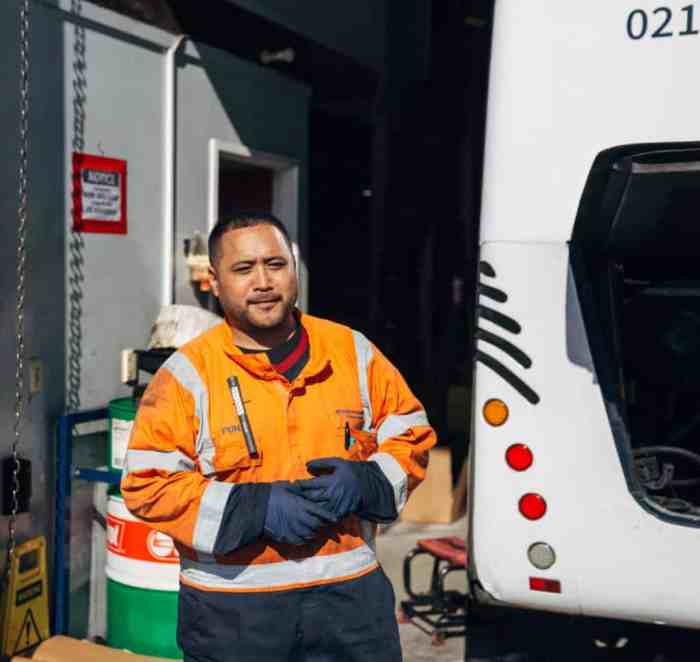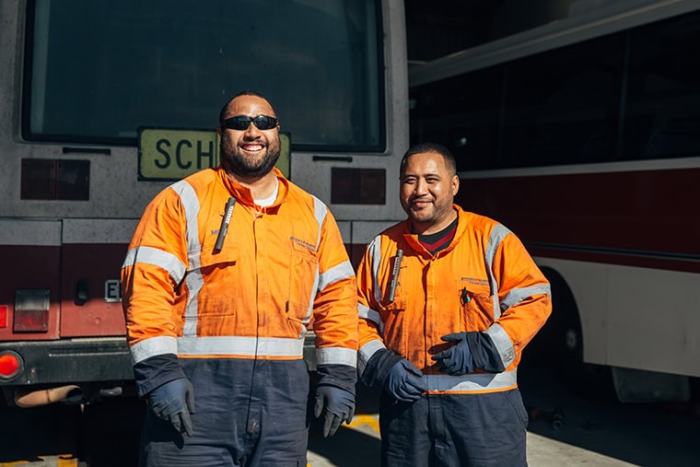Vosa Pitasini started out water blasting, but ended up learning about refrigeration and air conditioning on the job. Before long, he’d built up valuable knowledge and skills in the trade. The only problem? He had no qualifications to back it up. Find out how Vosa is planning to turn his practical skills into legitimate qualifications, which he’ll then be able to use to start his own business.
For Vosa Pitasini, getting into the refrigeration and air conditioning trade was a case of being in the right place at the right time.
He’d been water blasting for a small business called Man and Machine Company Care, when his boss picked up some work with air con units. Vosa started helping out with the basics, like changing and cleaning filters.
“We were proactive about our work and if we noticed a job that needed to be done, we put it in our report. And so we just kept getting more work while we were on site. Slowly, our clients gave all their air con work to us.”
As the business grew, they hired experienced tradies, who taught Vosa more skills. Eventually, he was fully focused on the refrigeration and air con side of the business.
“I got to the stage where I could do it by myself. I had my own van and I did my own work. The problem was, I didn’t have any qualifications.”

The 36-year-old father of three has now started taking steps to get official recognition for his skills, which would open up his career options.
“As I’ve gone along, I’ve realised that it’s better that I go and get my papers now, before I get too old. I know what I’m doing but I’ve just been wandering around without any qualifications.”
Going legit
Vosa’s first step was to enrol in a pre-trades course at Manukau Institute of Technology, supported by an MPTT scholarship.
“The course was expensive, so the financial support from MPTT was a big, big help,” he says.
While completing the course in 2020, he heard about another pathway to getting qualified. Called the Recognition of Prior Learning (RPL) programme, it recognises relevant experience, along with skills and knowledge gained through training, work experience and life experience.
Getting his skills certified through RPL would mean Vosa could get qualified without doing an apprenticeship. Instead, his training organisation Competenz would formally assess the skills he’s already learned and, if the assessor is satisfied he meets all the requirements, award him a qualification.
Vosa says this is a better option for him than an apprenticeship, because with his experience, being an apprentice would seem like taking a step backwards.
“I don’t want to go back and do an apprenticeship, because I’ve pretty much already done my apprenticeship. But I just never got the accreditation. Through the Recognition of Prior Learning programme, I can get certified up to my level of knowledge and competency.”



Fishing for opportunities
Since doing Level 3 at MIT last year, Vosa has gone out on his own as a sole trader, working three days a week. This means he’s already self-employed – but getting his qualification would allow him to employ other people and grow his own business.
In the meantime, Vosa has been making the most of opportunities that have come along.
“I love fishing. I’m setting myself up as a commercial fisherman, so when I’m not working, that’s what I’ll be doing — I’ll be out on the water. It’s a side business.”
Well known in the Tuvaluan community for his legendary flounder hauls, Vosa had been giving a lot of his catch away. But as part of his refrigeration work, he found himself fixing chillers for a number of seafood businesses. He spied an opportunity to start supplying them.
“If I’m catching these flounder, why not sell them to my refrigeration clients who own fish shops? So, I rang the authorities to find out what I need to do, and now I’m getting myself set up to do it properly.”

Rising to the challenge
Vosa’s path into the trades hasn’t been a traditional one, and he says it wasn’t something he would have chosen when he started out.
“I didn’t like this work in the beginning, but I did it because I didn’t really have any other options. But now I love it. All of a sudden I had the opportunity in front of me. I thought, ‘Hold on a minute: I’ve never done this before’. But I did it for my family because if I don’t work, then I can’t feed my kids,” he says.

“Now I enjoy the challenge and problem-solving in this trade. I don’t know everything yet, but I learn every day as I go along. I feel like I’m in a classroom. I’m always learning how to do things better.
Being willing to give it a go and try new things has paid off, he says.
“I think that’s the challenge: testing yourself and putting yourself in new things. And then it turned into a career with big potential for me to make a living out of it.
“Once qualified, I’ll probably build up my business and employ a few more qualified air con and refrigeration tradies. My own business – that’s where I’m heading.”
So what does it mean to have a great attitude, and how do you know if you have one? The bad news is, no one can do it for you – a good attitude comes from within. But the good news is, it’s simpler than you might think.
























